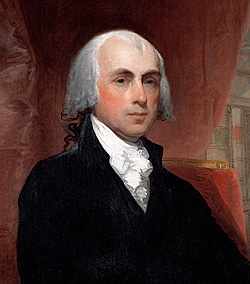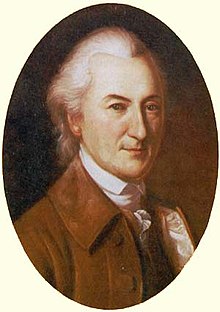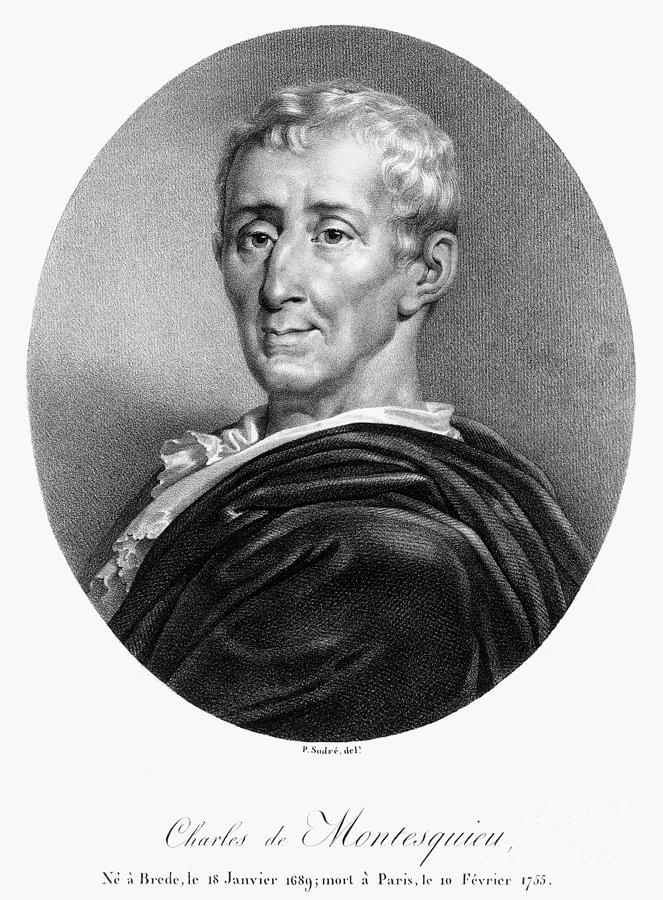All right. Now we can begin what I originally started this blog to discuss: The adoption of the U.S. Constitution.
From May 29 to September 17, 1878, delegates from twelve states (all except Rhode Island) met in Philadelphia, originally intending to strengthen the Articles of Confederation. Instead, they ended up drawing up an entire new system of government -- the U.S. Constitution, which has survived with some modifications to this day.
 |
| James Madison |
Reading over his notes, several things catch the attention. One is how readable the basic notes are. Most writing from the time have a stiff and elaborate tone that makes them difficult for the modern reader to struggle through. Perhaps it should not be surprising that Madison's notes are more accessible -- they are, after all, accounts of speeches, some planned in advance, but most relatively spontaneous. As such, they are less formal than written language. Another is Madison's frequent use of abbreviations. This should not be too surprising, given that he was taking down notes as people were speaking and would naturally have trouble keeping up. Another is that, in those days before Spellcheck, Madison's spelling and punctuation often leave much to be desired. Given the circumstances, this is entirely understandable, but somehow there is something reassuring in the thought that the "assembly of demigods" (Jefferson's words) could still misspell their words. Finally, the writing is often awkward, with all sorts of directions like "see note A," "here insert the speech," or "the following is a literal copy." Like any handwritten notes, Madison's could have used some polishing.
A few observations are also in order about the convention itself. One is on who was not present. Thomas Jefferson was overseas, serving as Minister (ambassador) to France. John Adams was also abroad, serving as Minister to Britain. John Hancock, Samuel Adams, and Patrick Henry all stayed away, distrusting the general project. Thomas Paine had returned to England.
 |
| John Dickinson |
"Reason" in this context, means something akin to what we would call ideology or social theory. The delegates rarely justified their actions in terms of ideology or theory alone, but certainly "reason" lurked in the background, influencing their actions. The two main social philosophers who influenced the delegates were John Locke and the Baron de Montesquieu. Locke is reasonably known to most modern-day Americans. He popularized the social contract theory of government -- that government was formed when the people emerged from an anarchical "state of nature" and agreed to submit to a government to protect them. Unclear is how literally Locke mean it. Did he believe the people mutually agreeing on a government was an actual, historical occurrence, or was it simply a metaphor for saying that that the legitimacy of government depends on the people's consent? Whatever Locke's actual intention, the delegates intended to take him at his word and form an actual social contract.
 |
| Montesquieu |
So the groundbreaking achievement of the U.S. Constitution was not in the separation of powers (as many textbooks seem to hint today), a concept that was already in existence. My next post will discuss what its real ground breaking achievements were.
_________________________________________________________
* Montesquieu saw liberty as compatible with hereditary monarchy, so long as the monarchy was governed by law, rather than arbitrary, and the separation of powers was maintained. Likewise, he believed that liberty could survive either a democratic or an aristocratic republic so long as the separation of powers was maintained, but that it would fail in a republic that did not maintain such separation.

No comments:
Post a Comment